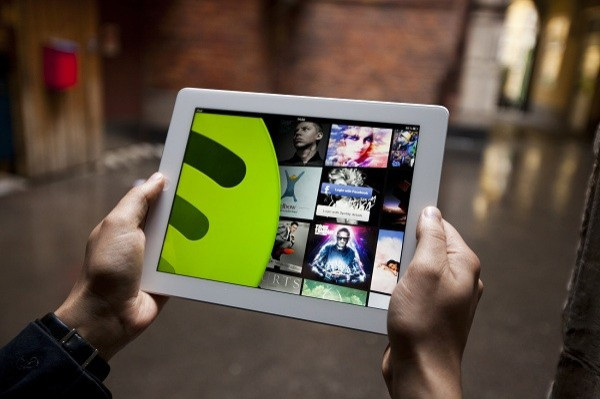Spotify Goes Mobile, But Profits Remain Elusive
Analysis


Streaming music service Spotify Ltd. launched a mobile radio feature on Tuesday that connects to Apple Inc.'s (Nasdaq: AAPL) ubiquitous iPhones and iPads, encroaching on the turf of online radio provider Pandora Media Inc. (NYSE: P).
But Spotify's founder and CEO Daniel Ek is thinking bigger. Consumption of music is at its all-time high. People are listening to more music than ever before, from a bigger diversity of artists, Ek said at a June panel sponsored by All Things Digital.
Ek said the music industry has plunged in value from a peak of around $45 billion to its current level of $15 billion, while half a billion people use illegal filesharing to download music. Spotify is seeking to convert the pirating masses to become paying users, and has earned the blessings of the big four major record labels, Sony Corp. (NYSE: SNE)'s Sony Music Group, Vivendi (Euronext: VIV)'s Universal Music Group, Warner Music Group and Citigroup (NYSE: C)'s EMI.
It's not really about competing with iTunes or anything else. It's really replacing the behavior that already exists from piracy services and taking them legal, said Eck.
The strategy has paid off in Eck's home country of Sweden, where Spotify single-handedly revived the flailing record industry. By offering nearly all published music from major labels -- a few big holdouts include the Beatles and Led Zeppelin -- in a slick and responsive interface, Spotify has aimed to become indispensable. Its tight integration with Facebook (Nasdaq: FB) and its curated playlists have also provided a critical social element that is largely absent from Pandora. Since expanding to the U.S. last year, the site has gained accolades and continued to raise cash. Spoitfy was reportedly valued at a staggering $4 billion in May as it prepared to raise another $220 million. Pandora's market cap is around $1.91 billion.
Neither company has ever reported profits. Spotify, which is private, had a loss of $41.5 million in 2010 by October. It has around 10 million users worldwide. Users can listen to music for free and hear a few ads each hour or, as 3 million subscribers have chosen, pay $5 or $10 per month for no advertising. However, Spotify pays hundreds of millions to record labels in order to license tracks on top of expenses like new offices and hiring engineers.
Pandora has also struggled to monetize its large user-base by running ads. In May, Pandora said first quarter active users grew 54 percent from the prior year to 51.9 million and revenue grew 58 percent to $80.8 million. But the company has to pay royalties each time a song is played, so increased traffic also leads to more costs. Despite a dominant 71.7 percent share of top 20 U.S. Internet radio services at the end of the first quarter 2012, Pandora lost nine cents a share. It expects to lose between seven and 11 cents per share in fiscal 2013. Pandora closed Tuesday at $11.45, nearly 30 percent below its IPO price of $16 per share.
Pandora's chief Joe Kennedy has previously downplayed the competition between Pandora and Spotify, describing the latter as a subscription service. But Spotify's move into mobile radio will undoubtedly create tension. Another company, Songza, has also emerged to become the most popular application in Apple's store. Songza asks users to select a particular mood and provides curated playlists that fit the description and charges no fees.
With the increasingly crowded field, perhaps Spotify would benefit by entering the music industry's last bastion of revenue: concert tickets. If it could cut a deal to partner with a company like Eventbrite, which said Monday it had sold over $1 billion in tickets since forming in 2006, or even Live Nation Entertainment Inc. (NYSE:LYV)'s Ticketmaster, the arrangement could be mutually beneficial. Spotify could provide information on upcoming concerts when an artist is played and refer users to ticketing sites, taking a referral fee. In doing so, Spotify could leverage perhaps its greatest asset: its influence as a tastemaker.
© Copyright IBTimes 2024. All rights reserved.





















